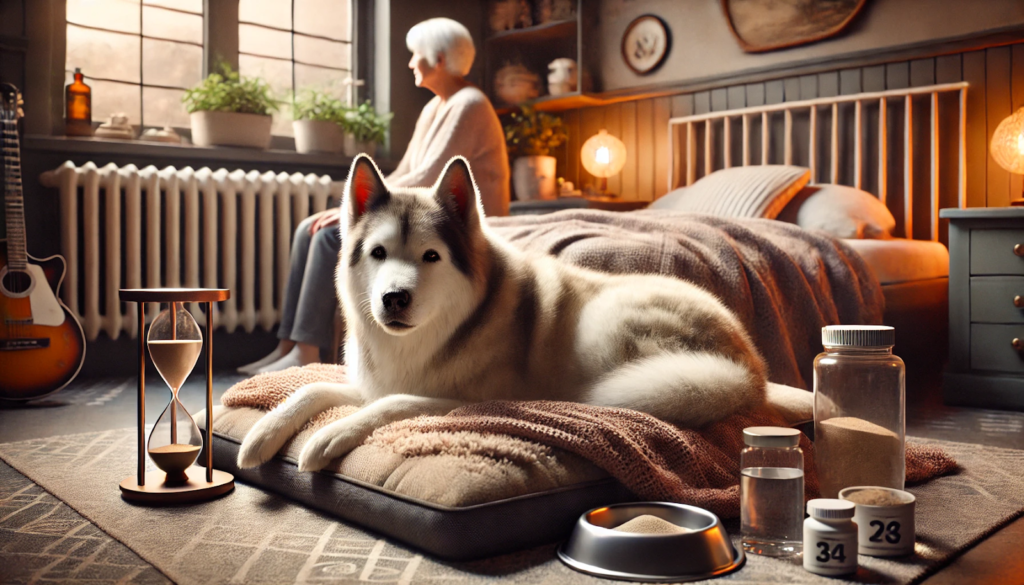Siberian Huskies are energetic, athletic, and full of life — and for many owners, the bond they form with their Husky is so deep that they wish it could last forever.
But how long do Huskies really live? And more importantly, what can you do to make sure your pup stays happy and healthy well into their golden years?
In this article, you’ll learn:
- The average lifespan of a Siberian Husky
- How to recognize and care for a senior Husky
- Practical tips to boost both longevity and quality of life
Average Lifespan of a Husky
Siberian Huskies typically live:
- 12 to 15 years on average
- Some may live up to 16 or 17 years with exceptional care
That’s a relatively long life for a medium-to-large dog, thanks to their strong genetics, athletic nature, and generally balanced temperament.
What Affects a Husky’s Lifespan?
1. Genetics
A Husky’s genetic background plays a major role in how long and how well they live. Responsible breeders test for:
- Hip dysplasia
- Eye conditions (like juvenile cataracts)
- Thyroid issues or epilepsy
Always choose Huskies from reputable breeders or well-screened rescues to give your dog the best start.
2. Nutrition
What you feed your Husky directly impacts their health:
- Choose high-quality, protein-rich food
- Avoid cheap fillers, artificial dyes, and preservatives
- Prevent overfeeding — obesity is a major factor in early aging
3. Exercise & Weight Management
Huskies are meant to move. Lack of exercise and excess weight can cause:
- Joint issues
- Heart problems
- Shorter lifespan
Keep your Husky active — even in their senior years.
4. Preventive Vet Care
Routine veterinary care is critical:
- Annual checkups (increase to biannual after age 10)
- Vaccinations and dental cleanings
- Routine bloodwork after age 7 to catch age-related issues early
Signs Your Husky Is Entering Their Senior Years
| Age Range | Common Signs |
|---|---|
| 7–9 years | Graying muzzle, slower post-exercise recovery |
| 10+ years | Reduced stamina, hearing/vision changes, increased napping |
| 12+ years | Joint stiffness, selective appetite, vocal sleep behaviors |
Every dog ages differently. Some Huskies remain playful and energetic right up to their final days — others may slow down more quickly.
Senior Husky Care Tips
1. Adjust Exercise — Don’t Stop It
Your older Husky still needs movement:
- Replace long runs with short, frequent walks
- Avoid high-impact activities like jumping
- Consider swimming or soft trail walking for gentle exercise
2. Support Joint Health
Help ease stiffness with:
- Glucosamine and omega-3 supplements
- Orthopedic dog beds for joint relief
- Vet-approved physical therapy or canine massage
3. Transition to a Senior Diet
Older Huskies benefit from food designed for aging bodies:
- Easier to digest
- Lower in calories to prevent weight gain
- Rich in nutrients like B vitamins, antioxidants, and fiber
4. Monitor Health Regularly
Keep a close eye on:
- Weight changes (loss or gain can signal health issues)
- Signs of pain, disorientation, or incontinence
- Behavioral shifts like increased whining or pacing
Vet visits should happen twice a year after your Husky turns 10.
5. Keep the Mind Active
Just because they’re older doesn’t mean they should stop learning! Offer:
- Puzzle toys
- Scent-based games
- Refresher training on familiar commands
Mental stimulation can help slow cognitive decline and keep your dog feeling young.
Helping Your Husky Age Gracefully
A few small changes can make a big difference:
- Stick to a daily routine to offer comfort and predictability
- Maintain social interaction with people and other pets
- Provide quiet, cozy rest spaces — but continue to engage gently
- Never stop showing affection, even if they’re less active
Senior Huskies may move slower, but their emotional needs remain just as strong.
Final Thoughts: From Puppy to Elder — Be Their Constant
Your Husky will likely remain full of personality throughout their life — but as they slow down, they’ll rely on you more than ever.
By adjusting their care, staying proactive with health monitoring, and offering patience and love, you can ensure your Husky enjoys a long, fulfilling life — from wild zoomies to sweet senior naps.
Be their constant companion — at every stage.






